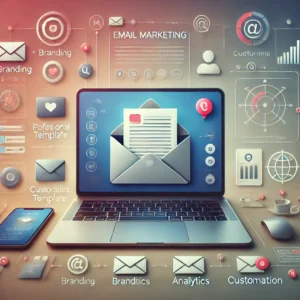Introduction
Email Automation For Small Businesses is more than just a time-saver it’s a powerful tool that can transform how you connect with customers. From sending personalized welcome emails to automated cart reminders, this technology helps small businesses streamline communication, nurture relationships, and boost sales. In this guide, we’ll explore how email automation works, its key benefits, and real-life success stories that show just how impactful it can be for growing businesses like yours.
What is Email Automation and Why Does It Matter for Small Businesses?
Email automation refers to the process of sending emails to your subscribers or customers automatically, based on predefined triggers or actions. Instead of manually crafting and sending individual emails, you set up workflows that deliver messages at the right time whether it’s a welcome email when someone subscribes, a follow up after a purchase, or a reminder about an abandoned shopping cart.
For small businesses, email automation is a game-changer. It allows you to communicate with your audience on a personal level without needing constant oversight. Imagine being able to send hundreds of personalized emails without lifting a finger that’s the power of automation.
Here’s why it matters:
- Saves Time and Resources
As a small business, you likely don’t have the time or manpower to send individual emails to each customer. Email automation takes care of that, allowing you to focus on other aspects of your business while keeping your audience engaged. - Improves Customer Experience
Automated emails make sure your customers receive timely, relevant content. Whether it’s a thank you message after a purchase or a special discount on their birthday, automation ensures customers feel valued, improving their overall experience. - Increases Sales and Conversions
With automated email sequences, you can strategically guide your leads through the sales funnel. For example, cart abandonment emails can help recover lost sales, while post-purchase emails can upsell or cross sell related products. - Provides Actionable Insights
Most email automation tools offer analytics, allowing you to track open rates, click-through rates, and conversions. This data helps you understand what’s working and what needs improvement, leading to smarter marketing decisions.
By using email automation, small businesses can scale their marketing efforts, increase customer engagement, and boost sales all while working more efficiently.
Key Benefits of Email Automation for Small Businesses
For small businesses, email automation is not just a time-saver it’s a powerful tool that can significantly boost your marketing efforts.
By automating your emails, you can engage with customers more effectively, nurture leads, and even increase revenue without constant manual input.
Let’s take a look at some of the key benefits email automation brings to small businesses.
1. Saves Time and Increases Efficiency
Email automation eliminates the need to manually send out emails, freeing up time to focus on other business priorities. Once workflows are set up, emails are automatically delivered at the right moment, whether it’s a welcome email or a follow up message. This automation allows small businesses to run more efficiently with minimal effort.
2. Improves Customer Segmentation and Personalization
With email automation, you can segment your audience based on specific actions, interests, or demographics. This means you can send personalized emails that resonate with each segment, improving the likelihood of engagement. For instance, you can send one type of email to new customers and a different message to returning ones, making your communication more targeted and relevant.
3. Boosts Lead Nurturing and Sales
By setting up automated workflows, you can nurture potential leads throughout the customer journey. Automated sequences, such as follow up emails or cart abandonment reminders, encourage leads to take action and complete purchases. This can directly lead to higher conversions and increased revenue.
4. Provides Better Tracking and Insights
Most email automation platforms offer built in analytics that let you track key metrics such as open rates, click through rates, and conversions. This data helps you understand which emails perform best and where improvements can be made, allowing you to refine your marketing strategy for better results.
5. Cost-Effective for Businesses with Limited Resources
Hiring a full marketing team can be expensive for small businesses, but email automation offers a cost effective alternative. With a relatively low investment, you can automate your email campaigns, reduce labor costs, and still maintain a highly effective marketing strategy.
Essential Email Automations Every Small Business Needs
Email automation can transform the way you interact with your customers, but to truly make the most of it, you need to set up the right automated workflows. These email automations can help you engage with your audience, increase sales, and build lasting relationships with customers.
Here are five essential email automations that every small business should have in place:
1. Welcome Email Series
A welcome email is your chance to make a great first impression. When someone signs up for your email list or makes their first purchase, an automated welcome series introduces your business, sets expectations, and builds rapport. You can use this opportunity to share your story, offer a discount on their first purchase, or guide them toward helpful resources.
2. Cart Abandonment Emails
On average, 70% of online shoppers abandon their carts without completing a purchase. Cart abandonment emails help recover these lost sales by sending a gentle reminder to customers who didn’t complete their order. You can sweeten the deal by offering an incentive like free shipping or a small discount to encourage them to return and finalize their purchase.
3. Follow-Up Sequences for Leads
Whether you’re generating leads from a landing page or capturing email addresses through a newsletter sign up, automated follow up emails are key to nurturing these leads. You can set up sequences to provide additional value, such as a downloadable guide, special offer, or informative content, guiding them toward making a purchase.
4. Customer Loyalty Emails
Building strong customer relationships is essential for long term success, and email automation can help you do that. Set up loyalty emails that reward repeat customers with exclusive offers, discounts, or early access to new products. These emails show your customers that you appreciate their business and help encourage future purchases.
5. Re-Engagement Campaigns
Inactive subscribers or customers who haven’t engaged with your business in a while are not a lost cause. A re engagement email campaign can help win them back. Automate emails to go out after a certain period of inactivity, offering incentives or asking for feedback to bring them back into the fold. These campaigns can revitalize interest in your products or services.
Choosing the Right Email Automation Tool for Your Small Business
Selecting the right email automation tool is a crucial step for any small business looking to streamline its marketing efforts. The right platform can help you save time, improve customer engagement, and increase sales. However, with so many options on the market, how do you choose the one that fits your needs?
Here are some key factors to consider when choosing the right email automation tool for your small business:
1. Ease of Use
As a small business owner, you likely don’t have time to spend hours learning a complicated system. Look for a tool that is intuitive and easy to navigate, with drag-and-drop features for building email campaigns and workflows. This will help you set up and manage your email automation without needing technical expertise.
2. Automation Features
Not all email marketing tools are created equal when it comes to automation. Ensure the tool you choose offers essential features like workflow automation, segmentation, triggered emails, and personalization. You should be able to automate sequences like welcome emails, cart abandonment reminders, and post-purchase follow ups effortlessly.
3. Integration with Other Tools
Consider how well the email automation tool integrates with your existing systems, such as your e-commerce platform, CRM, or payment processor. Seamless integration will allow for better data sharing and more personalized emails, improving the effectiveness of your campaigns.
4. Scalability
As your business grows, your email marketing needs will expand too. Choose a tool that can scale with your business, offering advanced features like A/B testing, analytics, and dynamic content as your campaigns become more sophisticated. You don’t want to outgrow your platform too quickly and have to switch later on.
5. Pricing and Budget
Pricing is always a consideration, especially for small businesses. Many email automation tools offer tiered pricing based on the number of subscribers or emails sent, so find a plan that fits your current budget. Some tools offer free trials or basic plans for small lists, which can be a great starting point for growing businesses.
6. Customer Support and Resources
Good customer support can make a big difference, especially when you’re just starting with email automation. Look for platforms that offer 24/7 support, comprehensive knowledge bases, and tutorials to help you get the most out of the tool.
7. Analytics and Reporting
To measure the success of your campaigns, you’ll need a tool that provides detailed analytics and reporting. Features like open rates, click-through rates, and conversion tracking will give you valuable insights into what’s working and where improvements are needed.
Best Practices for Email Automation in Small Businesses
Implementing email automation can significantly improve the efficiency of your marketing efforts, but it’s essential to follow proven strategies to ensure success. For small businesses, these best practices will help you maximize the impact of your automated campaigns while building stronger customer relationships.
1. Define Your Email Automation Goals
Before diving into automation, be clear about your objectives. Are you looking to increase sales, boost customer engagement, or drive more website traffic? Having defined goals will help you create targeted and effective workflows that align with your overall business strategy.
2. Segment Your Audience for Personalization
Audience segmentation is crucial to ensuring that your emails are relevant and timely.
By grouping your audience based on factors like behavior, demographics, or past purchases, you can send personalized messages that resonate.
For example, you could segment customers who have made a recent purchase and send them upsell emails for related products.
3. Optimize Timing and Frequency
Timing matters. Automated emails should be sent at the right moment to have the most significant impact. For instance, a cart abandonment email should be sent soon after the cart is abandoned waiting too long could cause you to lose a sale. Similarly, avoid bombarding your subscribers with too many emails. Find the right balance by testing different frequencies to see what works best for your audience.
4. Use Clear and Compelling Calls to Action (CTAs)
Your automated emails should always have a purpose, whether it’s to encourage a purchase, download a guide, or read a blog post. Include clear and compelling CTAs that make it easy for recipients to take action. Whether you use buttons or links, ensure that the CTA stands out and is easy to spot.
5. Test and Refine Your Workflows
Even well thought out automations need regular testing and refinement. Conduct A/B testing on subject lines, email design, and messaging to see what resonates best with your audience. Make data driven decisions based on open rates, click-through rates, and conversions to continuously improve your campaigns.
6. Focus on Mobile Optimization
More people are checking their emails on mobile devices than ever before, so it’s essential to optimize your emails for mobile viewing. Ensure your email design is responsive, with easy to read text, images that load quickly, and buttons that are easy to tap.
7. Maintain a Clean Email List
Regularly clean up your email list to remove inactive subscribers. This helps maintain high engagement rates and ensures that your emails are going to people who are genuinely interested in your business. A well maintained list also improves deliverability, reducing the chance of your emails ending up in spam folders.
8. Monitor Your Metrics
Tracking your email automation performance is vital to understanding what works and what doesn’t. Pay close attention to key metrics like open rates, click-through rates, and conversions. Use these insights to optimize your emails, improve workflows, and achieve better results.
Real-Life Success Stories: Small Businesses Winning with Email Automation
Email automation isn’t just for large corporations. Small businesses around the world are harnessing its power to drive growth, increase customer loyalty, and streamline their marketing efforts.
Here are some real life success stories of small businesses that have thrived using email automation.
1. Online Boutique Increases Sales with Abandoned Cart Emails
A small, family-owned online boutique struggled with cart abandonment, losing potential sales regularly. After implementing an automated abandoned cart email sequence, they saw a 20% increase in recovered sales. The automated emails were triggered to remind customers about their abandoned items within 24 hours, offering a small discount as an incentive to complete the purchase. This simple strategy helped them boost revenue significantly with minimal effort.
2. Local Coffee Shop Builds Customer Loyalty with Welcome Email Series
A neighborhood coffee shop used email automation to improve its customer engagement. By setting up an automated welcome email series for new subscribers, they not only introduced their brand but also offered exclusive deals and personalized recommendations. Within the first few months, they saw a 15% increase in foot traffic from email subscribers who had received their automated emails. The coffee shop used this opportunity to create a stronger bond with their local community while offering value through their emails.
3. Consulting Firm Nurtures Leads with Drip Campaigns
A small consulting firm specializing in business coaching struggled with lead nurturing. They implemented an automated drip email campaign that sent educational content, case studies, and testimonials to potential clients over a period of weeks. This drip campaign helped convert cold leads into warm prospects, resulting in a 30% increase in consultations.
By automating their lead nurturing process, the firm saved time and focused on delivering value through consistent communication.
4. E-commerce Store Boosts Repeat Purchases with Personalized Recommendations
A small e-commerce business selling eco-friendly products wanted to increase repeat purchases. They set up automated email sequences that recommended products based on previous purchases. By using personalized product recommendations in their emails, the business saw a 25% increase in repeat customers. The emails were sent out one week after a purchase, recommending complementary products and offering a loyalty discount, making the shopping experience more tailored and engaging.
5. Fitness Studio Retains Clients with Membership Renewal Reminders
A local fitness studio used email automation to manage membership renewals. They created a series of automated emails that reminded clients when their memberships were about to expire, offering early renewal discounts or incentives. As a result, they saw a 40% increase in timely renewals, reducing client churn and improving overall revenue. The automated reminders allowed the fitness studio to maintain strong relationships with its clients while providing a convenient service.
Final Thoughts
Email automation for small business has become a vital tool for growth, efficiency, and building lasting customer relationships.
By leveraging automation, small businesses can deliver timely, personalized, and relevant messages without the manual effort, allowing them to focus on scaling and nurturing their core operations.
Whether you’re automating customer onboarding, sending cart abandonment reminders, or promoting exclusive offers, email automation enables small businesses to stay competitive and responsive to their audience’s needs. The key is to start with a clear strategy, choose the right tools, and follow best practices to ensure your efforts drive real results.
If you’re not already using email automation, now is the perfect time to integrate it into your marketing strategy. From saving time to increasing revenue, the benefits are clear. Take the next step and unlock the full potential of your email marketing with automation.




